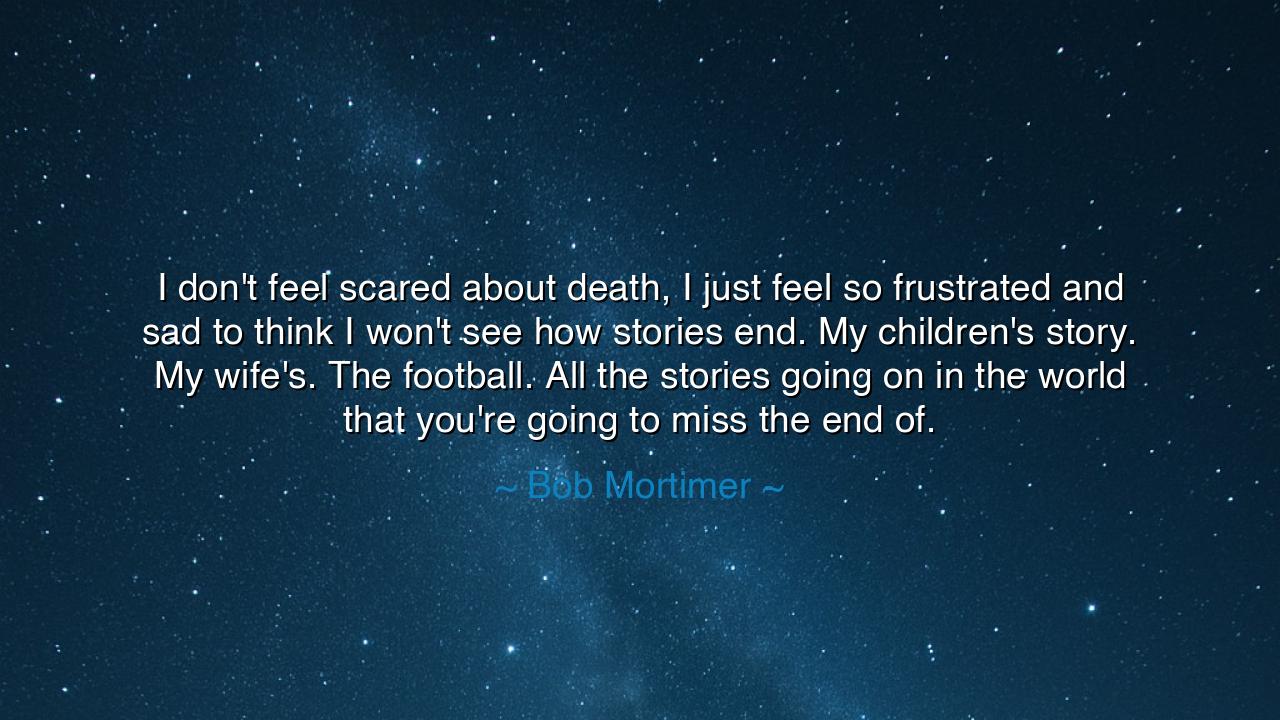
I don't feel scared about death, I just feel so frustrated and
I don't feel scared about death, I just feel so frustrated and sad to think I won't see how stories end. My children's story. My wife's. The football. All the stories going on in the world that you're going to miss the end of.






Here is a possible response:
In the words of the English comedian Bob Mortimer, there lies a truth both gentle and devastating: “I don’t feel scared about death, I just feel so frustrated and sad to think I won’t see how stories end. My children’s story. My wife’s. The football. All the stories going on in the world that you’re going to miss the end of.” Though spoken in quiet reflection, these words resound like an echo from the hearts of all who have ever stood before the mystery of mortality. He does not speak of fear—no trembling before the unknown—but of sorrow, the tender ache of leaving behind the unfolding beauty of life’s unfinished tales. It is the sadness of one who loves deeply, who has watched the sun rise and wondered what the next dawn might bring.
From the earliest ages, the ancients knew this feeling well. They built monuments not to defy death, but to converse with time—to whisper into eternity their wish to remain part of the world’s song. The Egyptians sealed letters in their tombs, not to boast of their power, but to tell the future, “Remember us, and know we once lived among you.” For to die, they thought, was not to vanish, but to lose the thread of the great tapestry of stories. Mortimer’s words carry this same spirit—the yearning to remain a witness to the ever-turning wheel of human destiny.
Consider the tale of Marcus Aurelius, emperor and philosopher. In his Meditations, he wrote of death as a natural dissolution, a return to the elements. Yet even this Stoic, who faced his end with serene acceptance, confessed a longing for the continued story of mankind. He urged his heart not to cling to fame or memory, but one senses beneath his calm prose the echo of Mortimer’s lament: a wish to keep watching—to see how Rome, and the world, would evolve after he was gone. Such is the paradox of wisdom: even when we understand that all must pass, our love for life makes us grieve the loss of participation in its endless narrative.
In Mortimer’s reflection, life is a story, not a possession. We are not the authors of every chapter, nor do we control how the tale unfolds—but oh, how we yearn to read the ending! To see our children rise, to see our friends grow old, to see the victories and defeats of our time. This yearning is not weakness; it is the highest form of love. To care for stories beyond our own is to declare allegiance to the living world. It is to say, “I am part of something larger, something that continues even when I cannot.”
The ancients would have called this feeling pathos, the sacred sorrow that awakens gratitude. For when one realizes that one’s eyes will not see the end of every story, one begins to watch more carefully the chapters that remain. Mortimer’s sadness is a quiet invitation—to cherish the now, to listen with reverence to the laughter of loved ones, to attend to the small dramas and joys that unfold each day. Every meal shared, every word spoken, every sunset watched becomes an act of sacred participation in the world’s ongoing tale.
Let us also remember the lesson of the Greek hero Achilles, who chose a short life of glory over a long life of peace. In his final moments, he did not regret his fate for its brevity, but for the stories he would never see—the return of his comrades, the peace after war. Yet his name endured because he lived fully, aware that every heartbeat was a verse in the song of humanity. Like Achilles, we too must accept that we are not eternal spectators, but living verses in a greater poem. Our task is not to see how all stories end, but to make our own story worthy of remembrance.
So, my child of tomorrow, let this be your lesson: do not fear the closing of your own book, but write it well while the ink still flows. Be curious about the stories of others. Ask your parents about their youth. Listen to your children’s dreams. Watch the seasons as if each one were a revelation. For though you will not see every ending, you will have lived among them—woven your own small thread into the vast, luminous tapestry of time.
And when the hour comes that you too must lay down your pen, may your heart echo Mortimer’s wisdom—not with terror, but with tender longing—knowing that the stories continue, that life itself is the great storyteller, and that somewhere, beyond your sight, the tale goes on.






AAdministratorAdministrator
Welcome, honored guests. Please leave a comment, we will respond soon